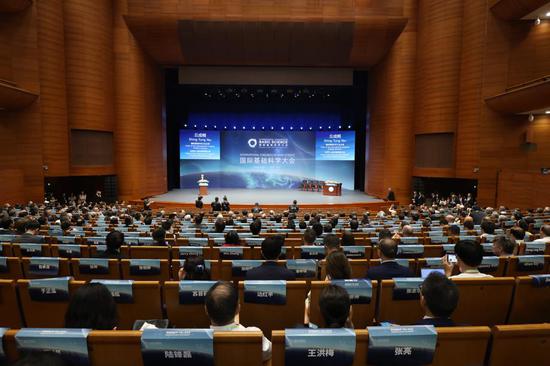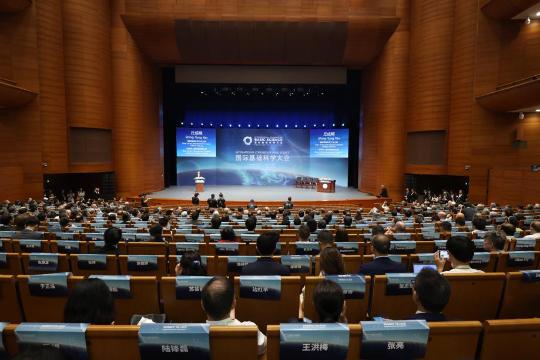Fundamental sciences key to humanity's future

The International Fundamental Science Congress (IFSC) is held in Tsinghua University on Sunday. (Photo provided to chinadaily.com.cn)
With the rapid development of Artificial Intelligence for the past few years, the integration and interaction among the three fundamental scientific fields namely mathematics, theoretical physics, and theoretical computer and information science are expected to bring more exciting breakthroughs in their cross-sectors, said Shing-Tung Yau, dean of and a professor at Qiuzhen College, Tsinghua University.
Yau also expressed his belief that in 21st century fundamental science will grow through the mutual understanding and impact of mathematics, physics, and AI. This interaction can provide a platform for people of different backgrounds, races, skin colors, and beliefs to communicate, discuss, and explore the mysteries of nature, working together for human happiness and the future, he said.
It was at the opening ceremony of the second session of the International Fundamental Science Congress (IFSC) held in Tsinghua University on Sunday that he uttered this. A leading global academic event in fundamental sciences, themed "Advancing science for humanity", the annual IFSC that began its first session in July 2023 has always been centered on mathematics, theoretical physics, and theoretical computer and information science that are considered basis of mankind's science.
Over 800 global scholars from various sectors, including Fields Medalists such as Edward Witten and Caucher Birkar, Turing Award winners Andrew Chi-Chih Yao and Leslie G. Valiant, Nobel Economics Prize winner Eric Maskin and International Mathematical Union President Hiraku Nakajima plus several Shaw Prize, Wolf Prize, and Breakthrough Prize laureates, over 70 academicians from various countries as well as presidents from more than 10 domestic universities attended the conference to discuss about the role fundamental sciences could play in mankind's future.
The conference also awarded the Lifetime Achievement in Fundamental Science and the Frontier Science Award to their respective recipients in recognition of their outstanding contributions.
Fields Medalist and US National Academy of Sciences (NAS) member Edward Witten expressed deep anticipation for his visit to Beijing, looking forward to hearing the latest research achievements of fundamental scientists from various fields. Nobel Laureate and NAS member Eric Maskin emphasized that scientists play a crucial role in fostering international exchange and cooperation amid complex global situations and hoped such an event of fundamental sciences can bridge scientists from various nations, while Fields Medalist Andrei Okounkov said that the conference demonstrated that "science knows no borders" and noted the vigorous development of mathematics in China, looking forward to engaging with many talented young scholars.
Held from July 14 to 26, the ICFS is not only an academic exchange event but also aims to provide an interactive platform for young scholars, students, and science enthusiasts. After the opening ceremony, activities that follow include three salons, namely Mathematics Night, Physics Night, and Computer Science Night that feature round-table forums and peak dialogues with international award winners. The Fundamental Science and AI Forum will explore the latest AI advancements and their connections to fundamental sciences. Additionally, a poster exhibition for university and high school students will showcase their research achievements to international scholars.

